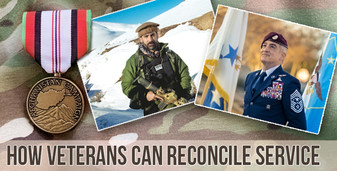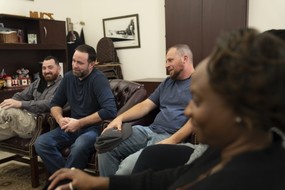|
|
Veterans from all eras are reacting to the events in Afghanistan, such as the U.S withdrawal and the takeover by the Taliban. You are not alone.Veterans may question the meaning of their service or whether it was worth the sacrifices they made. They may feel more moral distress about experiences they had during their service. It’s normal to feel this way. Talk with your friends and families, reach out to battle buddies, connect with a peer-to-peer network, or sign up for mental health services. Scroll down for a list common reactions and coping advice. |
||
Resources available right now
|
||
Common ReactionsIn reaction to current events in Afghanistan, Veterans may:
Veterans may question the meaning of their service or whether it was worth the sacrifices they made. They may feel more moral distress about experiences they had during their service. Veterans may feel like they need to expect and/or prepare for the worst. For example, they may:
Feeling distress is a normal reaction to negative events, especially ones that feel personal. It can be helpful to let yourself feel those feelings rather than try to avoid them. Often, these feelings will naturally run their course. If they continue without easing up or if you feel overwhelmed by them, the suggestions below can be helpful. Strategies for Managing Ongoing DistressAt this moment, it may seem like all is lost, like your service or your sacrifices were for nothing. Consider the ways that your service made a difference, the impact it had on others’ lives or on your own life. Remember that now is just one moment in time and that things will continue to change. It can be helpful to focus on the present and to engage in the activities that are most meaningful and valuable to you. Is there something you can do today that is important to you? This can be as an individual, a family member, a parent, or a community member. Something that is meaningful to you in regard to your work or your spirituality? Such activities won’t change the past or the things you can’t control, but they can help life feel meaningful and reduce distress, despite the things you cannot change. It can also help to consider your thinking. Ask yourself if your thoughts are helpful to you right now. Are there ways you can change your thinking to be more accurate and less distressing? For example, are you using extreme thinking where you see the situation as all bad or all good? If so, try and think in less extreme terms. For example, rather than thinking “my service in Afghanistan was useless” consider instead “I helped keep Afghanistan safe.” Finally, consider more general coping strategies that you may want to try including:
If you develop your own ways of adapting to ongoing events and situations, you may gain a stronger sense of being able to deal with challenges, a greater sense of meaning or purpose, and an ability to mentor and support others in similar situations. |
||
|
||
Need to contact VA?Veterans Crisis Line: 1-800-273-8255 and press 1, Chat, or Text 838255 Don’t know what number to call?1-800-MyVA411 (800-698-2411) is never the wrong number |
||
|
|
The VFW is always looking for vets in need. If you, or a vet you know need assistance in any way, please contact the Tellico Village VFW at (865) 408-8061.
 |
|
Summary of our 2021 Suicide prevention campaign
Tellico Village VFW Post 12135 is trying to impact a growing mental health problem
Suicide rates are highest amongst veterans, teens and the elderly, but the reality is a large part of our society feels the pain of suicide loss in some manner. 1st Lt. Alexander Bonnyman Jr. VFW Post 12135, located in Tellico Village TN, has always strived to bring attention to this mental health problem within our community. In prior years, the Post displayed 100 flags and signs during the September National Suicide Awareness Month in a central community space. While this helped to bring attention to the problem, it fell short of offering real solutions. Ed Frandle, the Post’s Suicide Awareness Project Leader, realized we needed to do something additional to try and bring awareness and make difference in this National Health issue. He and his team took the lead to develop a community-wide program to educate the community.
In September 2021, the Tellico Village VFW Post 12135 made a committed effort toward making a difference by facilitating a free community program that offered awareness and prevention techniques through a professional education and training forum. The VFW Post partnered with five Community Organizations who brought their own perspectives identifying the warning signs of those at risk and how to offer them help. The participating organizations who gave of their own free time to “help us help others” are:
- Knoxville Veteran Affairs Suicide Prevention Outreach Program
- Loudon County Veteran Service Officer (VSO)
- Stephen Ministry, Survivors of Suicide Loss support group
- First Responders from the Tellico Village Fire and Rescue Department
- Tellico Village Retired Registered Nurse Group
Post Commander Shawn Tallant opened the program with a sincere – THANK YOU – to each and every one present!! He voiced that “By being here today you’ve made a conscious decision to “become part of the solution” on what is often a difficult subject to speak openly about, let alone figure out how to make a difference!”. Commander Tallant went on to say; “Our purpose and goal is simple – when we walk out of this hall today, each one of us should be more aware of the issue, understand and recognize some of the suicide risk factors, and be armed with tools to help a person at risk – or at least a 1-800 number to point a person toward!”
The program commenced with a dynamic and detailed presentation from the Knoxville Veteran Affairs Suicide Prevention Outreach Program. Due to last minute government COVID restrictions, the VA Outreach team could not present their program in person. However, Dr. Autumn Lowry went out of her way to record and provide a 50-minute program, which illustrated their Community Engagement and S.A.V.E. training. The information and statistics provided presented a stark picture to this national problem and offered many key points in identifying Veterans at risk, asking the right questions and ways to steer them to the right agencies to get rapid and targeted help.
Next Jay Zimmerman, the Community Outreach Specialist at the VA Medical Center, shared a video created by the Overwatch Project of his experience as an Army medic when he was attacked by an insurgent, while rendering aid to an injured soldier. He was saved by his good friend Vic; however once state-side, Vic ultimately took his own life. Zimmerman states that Vic was one of the strongest Men he ever knew and any signs of suicide was totally missed. In the video, he goes on to talk about the importance of intervention between veterans, of having each other’s back and accountability in securing each other’s safety.
Jay Zimmerman, the Community Outreach Specialist at the VA Medical Center, shares a video created by the Overwatch Project of his experience as an Army medic
Another VA speaker was Mr. Ron Hutson, Loudon County Veterans Service Officer. Mr. Hutson, a USMC Vietnam Veteran, shared personal experiences he had in dealing with suicide. He also presented the County VA QPR program. QPR is the acronym for Question, Persuade, and Refer which details steps in awareness and prevention when the risk of suicide becomes evident.
The final speaker of the evening was Dr. Kristina Thiagarajan, Ph.D, M.N., R.N.
“Those who commit suicide are not the only victims. Suicide impacts 135 loved ones, left behind, to live a lifetime of pain and suffering.”. Dr. Thiagarajan started a support group called “Survivors of Suicide Loss” following the death of her own teenage son and the daughter of a close friend in 2019. The need for support during the grieving process is extremely important, especially in this age group. This group, along with the Stevens Ministry, helps to fill this need. Dr. Thiagarajan stated that the problem is epidemic, or specifically “contagion” as they’ve had 7 teen suicides in their local high school in a 2-year span, which defines a suicide “cluster” and community involvement is extremely crucial in order to bring things back to order. She delivered a powerful and personal message and encouraged us, as a community, to continue shedding light on this mental health problem.
Commander Tallant closed the event by thanking all the Community partners and presenters, as well as the 65 people in attendance. He said; “We hope each of you have gained more awareness into the problem of suicide in our community. And, you are walking out of today’s program armed with a few of the key risk indicators and have access to some of the tools and organizations standing by to assist those in need!”. He informed the audience that for the Veterans and Members of Tellico Village VFW Post 12135, this effort to make a difference in suicide prevention – Is Not Over. Today’s program is not a one and done event. We hope to receive feedback from all of you and come back in the spring with another event building upon this one. Please reach out to us if you hear or see something on this subject that could assist us in our effort to make a difference, to educate and better position each of us to “help a person off the ledge!“








